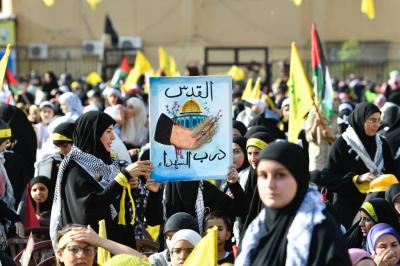Hassan Nasrallah, the Secretary-General of Hezbollah, delivered a significant speech during the commemoration of the party's martyrs on the road to Jerusalem (57 martyrs) yesterday. Political sources described Nasrallah's positions as sending a message to the internal audience, emphasizing that Hezbollah is a supporting force for the Palestinians and that the actual battle is in Gaza. They downplayed the publicly announced signals regarding the possibility of war expansion, noting that Hezbollah is aware of the dangers involved and that it is not easy to open two fronts, destroying the southern suburb or Beirut or other areas while Gaza is being devastated.
Sources characterized Nasrallah's first appearance after nearly a month since the implementation of the Al-Aqsa Flood operation by the Palestinian Hamas movement, which was accompanied by anticipatory preparations, propaganda campaigns, and the spreading of rumors and exaggerations among Lebanese and abroad, as a statement aimed at clarifying the party's involvement in the wide-scale war against Israel. This includes denying any connection between the Iranian regime and the party with the Al-Aqsa Flood operation, attributing it solely to Hamas in order to maintain operational margins for Tehran without any negative repercussions on Iran's interests with the West in general.
Furthermore, the decision regarding Hezbollah's potential participation in an expanded war against Israel is linked to the course of Israel's war against the Gaza Strip, implicitly suggesting that there is currently no Iranian decision to expand the war. The party's actions are thus limited to skirmishes and exchanges of rocket and gunfire in the hot regions along the southern Lebanese border, as is currently happening, with very few exceptions, while avoiding extensive involvement in the war at present.
Among the objectives is the insistence on the status and role of Hamas in any proposed solutions to end the war and explore the future peace framework between Israel and the Palestinians. This includes rejecting any scenarios promoting the military elimination of Hamas and its displacement from Gaza to abroad, similar to what happened with the Palestinian Liberation Organization and other Palestinian factions after the Israeli military invasion of Beirut in the summer of 1982, replacing them with other Palestinian forces like the Palestinian Authority. In clearer terms, this aims to secure Iran's place at the negotiating table being prepared primarily concerning the future of the Palestinian situation, through Hamas or directly.




